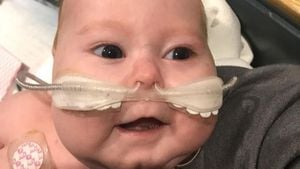Recurrent respiratory papillomatosis (RRP) is a serious airway condition caused primarily by human papillomavirus (HPV) types 6 and 11, known for necessitating multiple surgical interventions to manage papilloma growth. Recent research led by scientists from institutions including NYU Langone and the University of Texas Southwestern has explored an innovative treatment approach through the DNA immunotherapy INO-3107, with promising results.
The open-label Phase 1/2 trial aimed to assess the efficacy, safety, and immunogenicity of INO-3107 over 52 weeks (ClinicalTrials.gov identifier: NCT04398433). A total of 32 adults with HPV-related RRP, who required at least two surgical procedures in the year prior to treatment, were enrolled between October 2020 and November 2021. They underwent administration of four doses of INO-3107 through intramuscular injections followed by electroporation.
The study's primary endpoint focused on safety, particularly monitoring treatment-emergent adverse events (TEAEs). Secondary endpoints included evaluating the frequency of surgical interventions required post-treatment and assessing immune responses specific to HPV-6 and HPV-11 antigens.
Results revealed compelling evidence of clinical efficacy. An impressive 81% of the participants experienced reductions in the frequency of surgical interventions following treatment with INO-3107, compared to the year leading up to their first dose. Overall, 71.9% of patients demonstrated clinical responses, with nine individuals achieving complete responses (no surgical interventions required post-treatment).
Statistical analyses indicated significant decreases, with the median number of surgeries per patient declining from four to just one during the follow-up year. These findings highlight not only the drug's potential utility but also indicate substantial relief from the burden of recurrent surgeries, which carry inherent risks such as airway damage and negative impacts on voice and quality of life.
Further assessments showed marked immune responses with the treatment leading to induction of T-cells specific to HPV-6 and HPV-11. Blood analyses confirmed T-cell activation, demonstrating the potential of INO-3107 to generate effective immune responses against the virus. RNA sequencing from papillomas highlighted the presence of cytolytic CD8+ T-cell signatures, indicative of active anti-viral responses. The immune engagement was substantial, with 100% of the subjects showing T-cell expansions detectable throughout the study period.
Overall, the treatment exhibited tolerability with low-grade TEAEs reported, such as injection site pain, affirming its potential as a safe therapeutic option for patients suffering from this debilitating disease.
The study not only reinforces the hypothesis of immune-based therapy for RRP but also points to the possibility of reducing the frequency of surgeries required to manage the condition effectively. The authors of the article noted, "INO-3107 provides clinical benefit to HPV-6 and/or HPV-11-associated RRP adults and is well-tolerated," reflecting the significance of these findings within the clinical sedation.
Given the encouraging results and the continued burden of RRP, there is firmly established rationale for utilizing INO-3107 for treating this condition. Future clinical trials are already on the horizon, aimed at consolidations of efficacy, immune response kinetics, and exploring possible re-administration of the treatment to optimize patient outcomes. This research paves the way for improved management strategies for recurrent respiratory papillomatosis with potential to alter treatment paradigms significantly.



